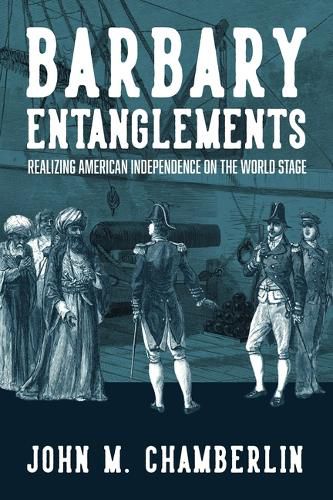Readings Newsletter
Become a Readings Member to make your shopping experience even easier.
Sign in or sign up for free!
You’re not far away from qualifying for FREE standard shipping within Australia
You’ve qualified for FREE standard shipping within Australia
The cart is loading…






How the United States' confrontation with North African raiders established its legitimacy on the world stage
For the fledgling United States of America, the first major foray onto the international stage came off the North African coast in the waters of the Mediterranean Sea. When Barbary corsairs preyed on American merchant ships, their young government and new navy were compelled to step in. Barbary Entanglements shows how interactions with the 'Barbary states' - the independent empire of Morocco and the semi-autonomous Ottoman regencies of Algiers, Tunis, and Tripoli - over the issue of privateering transcended economic grievances and allowed American consuls and servicemen to demonstrate the viability and reliability of their new nation within the European diplomatic system. More than simply protecting trade, US intervention against Barbary corsairs between 1784 and 1825 aimed to establish American sovereignty and demonstrate treaty-worthiness to their European 'sister nations.'
In this deeply researched and insightful study, John Chamberlin not only offers a granular account of how the 'Barbary system' of corsairing and ransom-slavery worked over four decades. He also highlights nascent federal authorities' coordinating diplomatic efforts with lesser European powers such as Sweden and Denmark to gain legitimacy, and he makes unprecedented use of Arabic language sources to reframe what we know about the development of early American foreign policy. In the process, he offers a dramatic retelling of how the United States first announced itself as a force to be reckoned with on the international scene.
$9.00 standard shipping within Australia
FREE standard shipping within Australia for orders over $100.00
Express & International shipping calculated at checkout
How the United States' confrontation with North African raiders established its legitimacy on the world stage
For the fledgling United States of America, the first major foray onto the international stage came off the North African coast in the waters of the Mediterranean Sea. When Barbary corsairs preyed on American merchant ships, their young government and new navy were compelled to step in. Barbary Entanglements shows how interactions with the 'Barbary states' - the independent empire of Morocco and the semi-autonomous Ottoman regencies of Algiers, Tunis, and Tripoli - over the issue of privateering transcended economic grievances and allowed American consuls and servicemen to demonstrate the viability and reliability of their new nation within the European diplomatic system. More than simply protecting trade, US intervention against Barbary corsairs between 1784 and 1825 aimed to establish American sovereignty and demonstrate treaty-worthiness to their European 'sister nations.'
In this deeply researched and insightful study, John Chamberlin not only offers a granular account of how the 'Barbary system' of corsairing and ransom-slavery worked over four decades. He also highlights nascent federal authorities' coordinating diplomatic efforts with lesser European powers such as Sweden and Denmark to gain legitimacy, and he makes unprecedented use of Arabic language sources to reframe what we know about the development of early American foreign policy. In the process, he offers a dramatic retelling of how the United States first announced itself as a force to be reckoned with on the international scene.